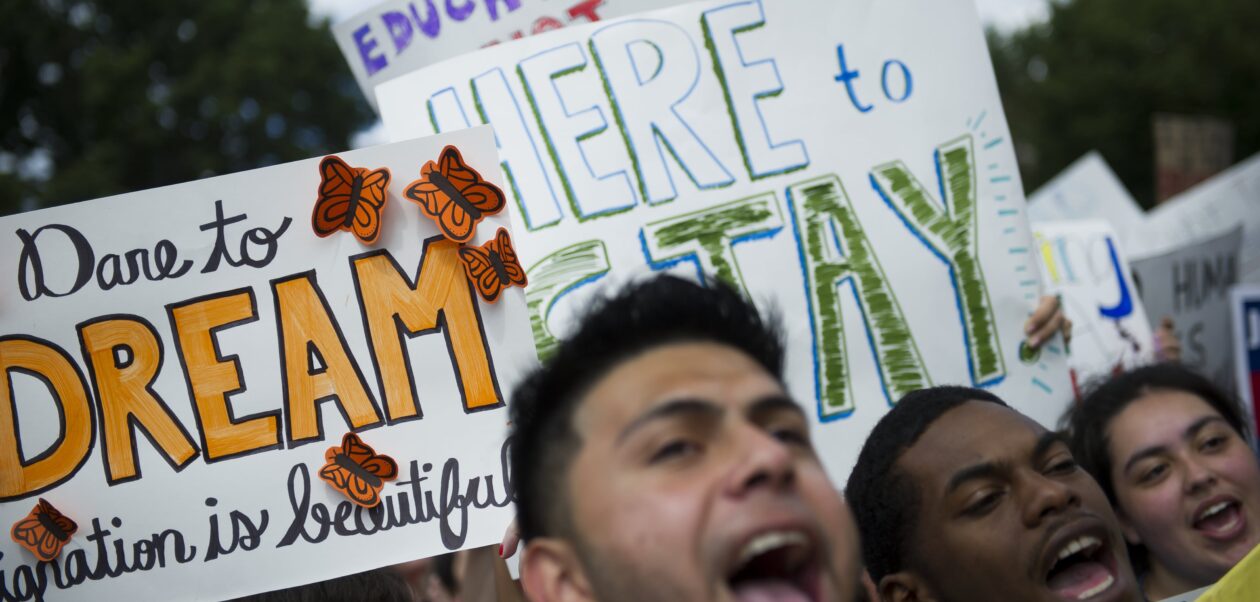:upscale()/2025/01/22/032/n/49351773/tmp_55ISit_8224d76d483b5807_BirthrightCitizenship_Main.jpg)
:upscale()/2025/01/22/032/n/49351773/tmp_55ISit_8224d76d483b5807_BirthrightCitizenship_Main.jpg)
When I was 11, I sat in my classroom, clutching my pencil case as though it could anchor me to the promise my teacher was so enthusiastically describing. She was speaking about the American Dream — about freedom, opportunity, and the boundless potential of a country built on collective courage and the diversity of people from all over the world. Her words painted a picture of a land where anyone could achieve greatness, where who you were or where you came from didn’t matter as much as the dreams you dared to pursue. At that moment, I believed her with all my heart, though I couldn’t yet see the sacrifices my parents had made to bring us here.
Her words were meant to inspire, but for me, they were fragile threads I struggled to hold onto. As I gripped my pencil case, I wondered if the American Dream she described was meant for someone like me — someone who was undocumented at the time. I didn’t yet understand what “immigration policy” meant, but I understood the whispered conversations at home, the tension in my parents’ voices, and the unspoken rules about who we could trust and what we could say. I wondered if I somehow looked “illegal,” as though my very existence depended on a perception I couldn’t control.
For millions of children across this country, my story is not a distant memory — it is their reality. And now, with President Trump’s executive order that aims to end birthright citizenship, their futures are being thrown into uncertainty for political theatre.
Birthright Citizenship: A Promise Under Threat
Birthright citizenship is more than a legal principle; it’s our country’s sacred promise to the sons and daughters of this land. Enshrined in the 14th Amendment since 1868, it guarantees that every child born on US soil belongs here. It’s a cornerstone of our democracy and a moral commitment to inclusion. Stripping it away would be devastating. It would reduce citizenship to a political bargaining chip, untethering the dreams of millions and leaving countless children and families in limbo.
To imagine the human cost, picture a child like I once was. A child who loves her country and dreams of becoming a teacher, scientist, or artist, but grows up with a shadow of fear and exclusion hanging over her life. A child who is told, in essence, that her belonging is conditional. That her humanity is a matter for debate.
The psychological toll of living in chronic fear is profound.
The proposal to end birthright citizenship isn’t just morally troubling — it’s legally and logistically very questionable. Such a change would necessitate amending the Constitution, a process demanding years of legal battles, the support of two-thirds of Congress, and ratification by 38 states — an immense expenditure of taxpayer dollars. Birthright citizenship cannot be undone by an executive order, as the Constitution supersedes such actions. The irony is clear: a president sworn to uphold the Constitution would be actively working to undermine it.
According to the American Immigration Council, as of 2018, at least 4.4 million children under the age of 18 lived with at least one undocumented parent. Stripping these children of their citizenship would create a generation of stateless individuals — children born in this country but denied a legal identity. Statelessness would thrust them into a life defined by exclusion, uncertainty, and limited access to education, healthcare, and economic opportunity.
This isn’t just a policy debate; it’s a moral question that tests our core principles. How can a nation built on the ideals of opportunity and belonging consider turning its back on its children?
What I Learned Growing Up Undocumented, and a Call to Action
Growing up undocumented — always questioning if the country viewed me as “illegal” — left an indelible mark on me. The psychological toll of living in chronic fear is profound. It makes you constantly question your safety. It lowers your self-worth and shatters your self-esteem. It also turns you into a hypervigilant child who does not know how to truly rest. At least that is a little bit of what it did to me — and what I’ve had to work so hard to overcome and heal.
I also know the power of hope. Despite the challenges, I’ve lived the American Dream.
Yet, I also know the power of hope. Despite the challenges, I’ve lived the American Dream. I’ve spoken on global stages at Cannes Lions, led transformative teams at some of the world’s most recognized media companies, and built a career I couldn’t have imagined as that little girl clutching her pencil case.
But none of this erases the fear I once felt or the resilience it took to overcome it. That little girl is why I write this article today — every child deserves to dream and live without fear.
This isn’t just about policy, though ending birthright citizenship would come at an enormous economic cost. It’s about who we are as a nation. Will we uphold the principles of equality and inclusion, or will we turn our backs on them?
Imagine that little girl in the classroom. She’s watching us. What will we teach her? That her dreams are conditional, or that she belongs here just as much as anyone else?
The choice is ours. Let’s protect the 14th Amendment, advocate for comprehensive immigration reform, and ensure that every American child feels the security of belonging. Let’s remind ourselves that our strength lies in our diversity and that our greatest legacy will be the promise we keep to the next generation of their right to dream.
In a world where fear can dim the light in a child’s eyes, we must be the leaders who nurture hope, ensuring that every child’s dreams shine brightly. That is the promise of America — a promise we must keep.
Sylvia Banderas Coffinet is a distinguished Latine marketplace expert and C-suite executive with nearly two decades in media strategy and multicultural marketing. A Forbes Trailblazing Latina Executive in Media, she is passionate about amplifying Latine voices and championing diversity in media.




